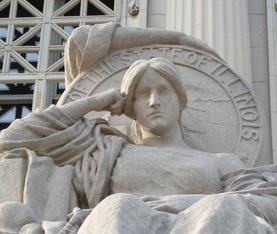The Appellate Court of Illinois, First District, recently held that an allegation that the plaintiff is a “mortgagee” under the Illinois Mortgage Foreclosure Law (IMFL) is sufficient to plead its capacity to sue. A copy of the opinion in Wells Fargo Bank, N.A. v. Mundie is available at: Link to Opinion. The plaintiff mortgagee filed a complaint alleging defendant borrowers were in default, and that it was the “mortgagee” under the IMFL, 735 ILCS 5/15-1208. The plaintiff attached copies of the mortgage and the note indorsed in blank to the complaint. The defendants subsequently filed a motion to dismiss and requested…
National financial services law firm Maurice Wutscher LLP has opened a new office in Atlanta, hiring financial services attorney D. Sharmin Arefin to lead the firm’s Georgia litigation and regulatory compliance matters. Arefin will practice in the firm’s Consumer Credit Litigation, Regulatory Compliance, Employment Litigation, and Commercial Litigation groups. She joins Maurice Wutscher’s skilled team of litigators who specialize in appellate matters, business formation and transactions, class action litigation, commercial litigation, construction litigation, consumer credit litigation, contested bankruptcies, contested foreclosures, employment and civil litigation, insurance recovery and advisory services, intellectual property litigation, and regulatory compliance, in offices throughout the United…
Reversing the trial court’s ruling dismissing the action for lack of standing, the U.S. Court of Appeals for the Seventh Circuit recently held that the increased risk of fraudulent credit or debit card charges and possible identity theft due to a data breach that already occurred was “certainly impending future harm” and was sufficient for Article III standing. In addition, the Court also held that time and money the plaintiffs allegedly spent resolving fraudulent charges and possible identity theft also were sufficient injuries for Article III standing. However, this opinion was issued prior to the Supreme Court of the United…
The U.S. Court of Appeals for the Third Circuit recently upheld a trial court’s ruling that an unaccepted offer of judgment under Fed. R. Civ. Pro. Rule 68, made before a plaintiff files a motion for class certification, does not make the case moot. The copy of the opinion in Weitzner v. Sanofi Pasteur, Inc. is available at: Link to Opinion. The named plaintiff filed a putative class action against the defendants for alleged violation of the federal Telephone Consumer Protection Act (TCPA). The plaintiff alleged that the defendants transmitted more than 10,000 facsimiles to the plaintiff and other members of…
The U.S. Court of Appeals for the Eleventh Circuit recently held that a borrower properly pleaded a “notice of error” claim under the federal Real Estate Settlement Procedures Act (RESPA), reversing the lower court’s grant of the servicer’s motion to dismiss. A copy of the opinion in Renfroe v. Nationstar Mortgage, LLC is available at: Link to Opinion. In 2006, a borrower refinanced her mortgage with a lender, with monthly payments of $998.68. Several years later, servicing of the loan was transferred. The borrower’s payments allegedly increased by about $100 after the transfer. The borrower claimed that she repeatedly contacted the…
The Appellate Court of Illinois, First District, recently held that the form foreclosure complaint provided by the Illinois Mortgage Foreclosure Law (IMFL) complies with procedural due process guarantees of the Fifth and Fourteenth Amendments of the United States Constitution, and does not violate the Illinois Constitution’s separation of powers doctrine by usurping the Illinois judiciary’s rulemaking power. A copy of the opinion in Wells Fargo Bank N.A. v. Bednarz is available at: Link to Opinion. A mortgagee foreclosed on the defendant borrower’s residential property. The mortgagee’s complaint tracked a form complaint set forth in section 1504(a) of the IMFL. Section 15-1504(c)…
The U.S. Court of Appeals for the Sixth Circuit recently held that two borrowers lacked standing to challenge the validity of a deed of trust in a lien priority dispute interpleader action filed by the foreclosure trustee, as the borrowers did not dispute that they executed the deed of trust, the lien placed on the property was valid, or that they were in default. In so ruling, the Court rejected the borrowers’ argument that an alleged defect in the acknowledgement invalidated the deed of trust, because a validly recorded instrument that was not properly acknowledged shall nevertheless place “all interested…
Yesterday’s decision from the U.S. Supreme Court in Spokeo v. Robins should bolster the defense of companies subject to several federal consumer protection statutes. The ruling addresses lawsuits that claim an injury created solely by the violation of a federal statute and require the plaintiff to demonstrate not only that the statute was violated, but that the plaintiff herself suffered harm. The opinion does not go as far as many in the consumer financial services industry would have liked (not all injuries must be “tangible”), but it does close the door on civil lawsuits many have faced. The opinion was…
In a unanimous decision yesterday, the U.S. Supreme Court held that attorneys retained as independent contractors by the Ohio Attorney General to collect debts owed to the state do not violate the federal Fair Debt Collection Practices Act (FDCPA) when sending collection letters on Attorney General letterhead. In so ruling, the Court noted that the FDCPA “bars debt collectors from deceiving or misleading consumers; it does not protect consumers from fearing the actual consequences of their debts.” Authored by Justice Ginsburg, a copy of the opinion in Sheriff v. Gillie is available here: Link to Opinion. Under Ohio law, debts owed…
The District Court of Appeal of Florida, Fourth District, recently upheld a trial court’s ruling that a plaintiff mortgage loan servicer had authority to initiate foreclosure proceedings against borrowers on a mortgage loan evidenced by an electronic note. The Fourth DCA also held that the e-note was a transferable record under the Uniform Electronic Transactions Act. A copy of the opinion in Rivera v. Wells Fargo Bank, NA is available at: Link to Opinion. In April 2008, the borrowers executed an electronic note (“e-note”) in favor of the lender, evidencing a loan secured by a mortgage. In January 2010, the servicer…
The Court of Appeal of the State of California, First Appellate District, recently upheld a trial court’s demurrer without leave to amend in a case in which a judicially noticed Purchase and Assumption Agreement (“P&A Agreement”) contradicted the borrower’s allegations that a subsequent purchaser of the loan had no authority to foreclose on her property. A copy of the opinion in Brown v. Deutsche Bank National Trust Company as Trustee for WAMU Mortgage Pass-Through Certificates Series et al. can be found at: Link to Opinion. In 2004, a borrower obtained a $450,000 loan secured by a deed of trust recorded against…
The U.S. Court of Appeals for the Fifth Circuit recently affirmed the dismissal of a borrower’s claims against her lender arising out of a foreclosure, holding among other things that alleged discrepancies as to the lender’s automatic payment withdrawal services did not state a claim under the Texas Deceptive Trade Practices Act (DTPA). In so ruling, the Court also affirmed the denial of a plaintiff borrower’s motion to join a non-diverse defendant holding that the motion was improperly brought for the purpose of defeating diversity jurisdiction. A copy of the opinion in Villarreal v. Wells Fargo Bank, NA is available at:…












